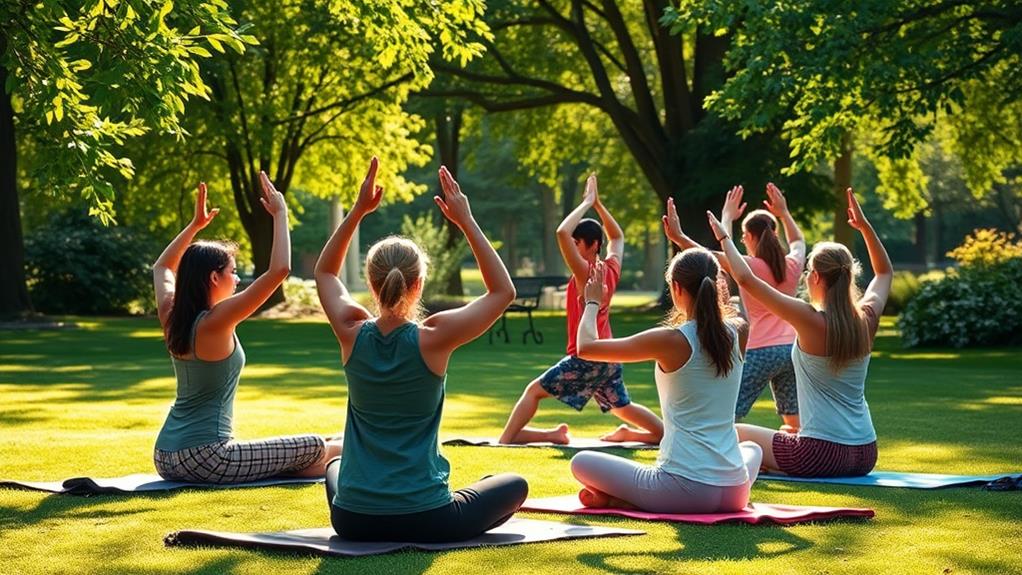How Yoga Helps Teens Maintain Emotional and Physical Well-being
You might be surprised to learn how yoga can greatly impact a teen's emotional and physical well-being. By incorporating mindfulness and breathing techniques, it helps manage stress and anxiety that often come with adolescence. Not only does it foster resilience, but it also strengthens the body and promotes a positive self-image. As you explore the various benefits, you'll discover how these practices can empower teens to navigate life's challenges more effectively. What's intriguing is the connection between physical strength and emotional balance—let's uncover how these elements intertwine.
Benefits of Yoga for Teens

Why should teens consider incorporating yoga into their daily routine? Well, it's a fantastic way to boost your physical and mental well-being!
First off, yoga helps you strengthen your muscles and improve flexibility. Think about it—who wouldn't want to be able to touch their toes without a struggle? Plus, it's a great way to stay active without the pressure of competitive sports.
But there's more! Practicing yoga can also enhance your balance and posture. If you're slouching over your phone or computer all day, this can really help you stand tall and feel confident.
And let's not forget about breathing. Yoga teaches you to breathe deeply, which can help you feel more relaxed and focused.
You might even find that yoga can help with sleep. A short session before bedtime can calm your mind, making it easier to drift off. It's like giving your brain a little "Do Not Disturb" sign!
So, why not give it a try? Whether you're a total newbie or a budding yogi, you'll likely find something that makes you feel good about yourself.
Emotional Regulation Through Yoga
Practicing yoga can be a powerful tool for emotional regulation, helping you manage stress and anxiety more effectively. When you step onto the mat, you're not just stretching your body; you're also giving your mind a chance to relax. Deep breathing, a key part of yoga, helps calm your racing thoughts and brings you back to the present moment. It's like hitting the pause button on a busy day!
As you flow through different poses, you learn to focus on your body and feelings. This practice can make you more aware of your emotions, so you're less likely to react impulsively. For example, when you feel frustrated, a few minutes in child's pose can help you chill out and think things through.
Plus, yoga encourages you to be kind to yourself. It's okay if you can't touch your toes right away! Remember, every small step counts.
By practicing regularly, you'll find it easier to handle tough situations. You'll start to notice that you're not just bending your body, but also bending the stress and worries away.
Physical Resilience and Strength

Yoga's unique blend of movement and mindfulness builds both physical resilience and strength in teens. When you practice yoga, you're not just stretching; you're also strengthening your muscles and improving your balance. Each pose you hold helps develop muscle tone and flexibility, which means you'll feel more powerful and agile. Imagine how cool it feels to be able to do a headstand or hold a warrior pose without wobbling!
Plus, yoga's gentle movements are great for preventing injuries. Instead of jumping into high-impact sports, you can ease into physical activity, allowing your body to adapt and grow stronger over time. You might even notice that you can run faster or jump higher in other activities after practicing yoga regularly.
And let's not forget about coordination! As you flow through different poses, you're also enhancing your body awareness, which helps you move more smoothly in everyday life.
Mindfulness and Stress Relief
Building strength and resilience isn't just about physical capability; it also involves mental well-being. When you practice yoga, you immerse yourself in mindfulness, which helps you focus on the moment. Imagine taking a deep breath and letting all your worries float away, like balloons in the sky. That's the magic of mindfulness!
Stress can feel like a heavy backpack you're carrying around all day. But guess what? Yoga helps you take that backpack off. Through gentle stretches and mindful breathing, you learn to calm your mind. You become aware of your feelings, allowing you to process them instead of letting them pile up like laundry.
Plus, when you're centered and relaxed, you handle stress better. You might even find yourself laughing at small problems instead of getting upset. It's like having superpowers!
Mindfulness in yoga isn't just about sitting quietly; it's about noticing how your body feels and what's happening around you. It's a fun way to discover peace within yourself.
Supporting Teen Health as Caregivers

As a caregiver, you play an essential role in supporting your teen's health and well-being. It's like being the captain of a ship, steering them through the sometimes choppy waters of adolescence. You mightn't have a magic wand, but your encouragement can work wonders!
First, make time for open chats. Ask them about their day, or if they feel stressed about school. Listening without judgment helps them feel understood. Plus, it gives you a chance to share some of your own wisdom—like how yoga can help with those stress levels!
Next, keep an eye on their physical health. Encourage them to try new activities—like yoga! It's not just about stretching; it's about building strength and balance, too. And who doesn't love a good downward dog?
Lastly, set a good example. Show them that taking care of yourself is important. Exercise, eat well, and practice mindfulness. Your teen will notice and likely follow your lead.
Effective Methods for Reducing Fever
When your teen has a fever, it can be concerning, but there are effective methods to help reduce it. First, make sure they're drinking plenty of fluids. Water, herbal teas, or even broth can help keep them hydrated. You don't want them turning into a raisin, after all!
Next, consider giving them age-appropriate over-the-counter medications, like acetaminophen or ibuprofen, to help bring down the fever. Be sure to follow the instructions on the label. A cool, damp washcloth on their forehead can also be soothing. It's like a mini spa day, just without the fancy candles!
Keep your teen comfy by dressing them in light clothing and keeping the room at a comfortable temperature. If they're too hot, they might feel even worse. Encourage them to rest, as sleep helps their body fight whatever's causing the fever.
Lastly, if the fever lasts more than a couple of days or reaches a high temperature, don't hesitate to contact a healthcare professional. You want your teen feeling better, and sometimes a little expert advice goes a long way!











Post Comment